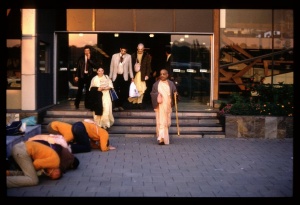SB 10.79.16-17: Difference between revisions
(Vanibot #0018 edit: make synonym terms in Sanskrit italic in SB - Vanisource) |
(Vanibot #0054 edit - transform synonyms into clickable links, which search similar occurrences) |
||
| Line 30: | Line 30: | ||
<div class="synonyms"> | <div class="synonyms"> | ||
''tatra'' | ''[//vanipedia.org/wiki/Special:VaniSearch?s=tatra&tab=syno_o&ds=1 tatra]'' — there (at Setubandha, known also as Rāmeśvaram); ''[//vanipedia.org/wiki/Special:VaniSearch?s=ayutam&tab=syno_o&ds=1 ayutam]'' — ten thousand; ''[//vanipedia.org/wiki/Special:VaniSearch?s=adāt&tab=syno_o&ds=1 adāt]'' — He gave away; ''[//vanipedia.org/wiki/Special:VaniSearch?s=dhenūḥ&tab=syno_o&ds=1 dhenūḥ]'' — cows; ''[//vanipedia.org/wiki/Special:VaniSearch?s=brahmaṇebhyaḥ&tab=syno_o&ds=1 brahmaṇebhyaḥ]'' — to brāhmaṇas; ''[//vanipedia.org/wiki/Special:VaniSearch?s=hala&tab=syno_o&ds=1 hala]-[//vanipedia.org/wiki/Special:VaniSearch?s=āyudhaḥ&tab=syno_o&ds=1 āyudhaḥ]'' — Lord Balarāma, whose weapon is the plow; ''[//vanipedia.org/wiki/Special:VaniSearch?s=kṛtamālām&tab=syno_o&ds=1 kṛtamālām]'' — to the Kṛtamālā River; ''[//vanipedia.org/wiki/Special:VaniSearch?s=tāmraparṇīm&tab=syno_o&ds=1 tāmraparṇīm]'' — the Tāmraparṇī River; ''[//vanipedia.org/wiki/Special:VaniSearch?s=malayam&tab=syno_o&ds=1 malayam]'' — Malaya; ''[//vanipedia.org/wiki/Special:VaniSearch?s=ca&tab=syno_o&ds=1 ca]'' — and; ''[//vanipedia.org/wiki/Special:VaniSearch?s=kula&tab=syno_o&ds=1 kula]-[//vanipedia.org/wiki/Special:VaniSearch?s=acalam&tab=syno_o&ds=1 acalam]'' — the principal mountain range; ''[//vanipedia.org/wiki/Special:VaniSearch?s=tatra&tab=syno_o&ds=1 tatra]'' — there; ''[//vanipedia.org/wiki/Special:VaniSearch?s=agastyam&tab=syno_o&ds=1 agastyam]'' — to Agastya Ṛṣi; ''[//vanipedia.org/wiki/Special:VaniSearch?s=samāsīnam&tab=syno_o&ds=1 samāsīnam]'' — sitting (in meditation); ''[//vanipedia.org/wiki/Special:VaniSearch?s=namaskṛtya&tab=syno_o&ds=1 namaskṛtya]'' — bowing down; ''[//vanipedia.org/wiki/Special:VaniSearch?s=abhivādya&tab=syno_o&ds=1 abhivādya]'' — glorifying; ''[//vanipedia.org/wiki/Special:VaniSearch?s=ca&tab=syno_o&ds=1 ca]'' — and; ''[//vanipedia.org/wiki/Special:VaniSearch?s=yojitaḥ&tab=syno_o&ds=1 yojitaḥ]'' — granted; ''[//vanipedia.org/wiki/Special:VaniSearch?s=tena&tab=syno_o&ds=1 tena]'' — by him; ''[//vanipedia.org/wiki/Special:VaniSearch?s=ca&tab=syno_o&ds=1 ca]'' — and; ''[//vanipedia.org/wiki/Special:VaniSearch?s=āśīrbhiḥ&tab=syno_o&ds=1 āśīrbhiḥ]'' — blessings; ''[//vanipedia.org/wiki/Special:VaniSearch?s=anujñātaḥ&tab=syno_o&ds=1 anujñātaḥ]'' — given permission to leave; ''[//vanipedia.org/wiki/Special:VaniSearch?s=gataḥ&tab=syno_o&ds=1 gataḥ]'' — He went; ''[//vanipedia.org/wiki/Special:VaniSearch?s=arṇavam&tab=syno_o&ds=1 arṇavam]'' — to the ocean; ''[//vanipedia.org/wiki/Special:VaniSearch?s=dakṣiṇam&tab=syno_o&ds=1 dakṣiṇam]'' — southern; ''[//vanipedia.org/wiki/Special:VaniSearch?s=tatra&tab=syno_o&ds=1 tatra]'' — there; ''[//vanipedia.org/wiki/Special:VaniSearch?s=kanyā&tab=syno_o&ds=1 kanyā]-[//vanipedia.org/wiki/Special:VaniSearch?s=ākhyām&tab=syno_o&ds=1 ākhyām]'' — known as Kanyā-kumārī; ''[//vanipedia.org/wiki/Special:VaniSearch?s=durgām&tab=syno_o&ds=1 durgām] [//vanipedia.org/wiki/Special:VaniSearch?s=devīm&tab=syno_o&ds=1 devīm]'' — Goddess Durgā; ''[//vanipedia.org/wiki/Special:VaniSearch?s=dadarśa&tab=syno_o&ds=1 dadarśa]'' — saw; ''[//vanipedia.org/wiki/Special:VaniSearch?s=saḥ&tab=syno_o&ds=1 saḥ]'' — He. | ||
</div> | </div> | ||
Latest revision as of 19:58, 17 February 2024

A.C. Bhaktivedanta Swami Prabhupada
Please note: The synonyms, translation and purport of this verse were composed by disciples of Śrīla Prabhupāda
TEXTS 16-17
- tatrāyutam adād dhenūr
- brāhmaṇebhyo halāyudhaḥ
- kṛtamālāṁ tāmraparṇīṁ
- malayaṁ ca kulācalam
- tatrāgastyaṁ samāsīnaṁ
- namaskṛtyābhivādya ca
- yojitas tena cāśīrbhir
- anujñāto gato 'rṇavam
- dakṣiṇaṁ tatra kanyākhyāṁ
- durgāṁ devīṁ dadarśa saḥ
SYNONYMS
tatra — there (at Setubandha, known also as Rāmeśvaram); ayutam — ten thousand; adāt — He gave away; dhenūḥ — cows; brahmaṇebhyaḥ — to brāhmaṇas; hala-āyudhaḥ — Lord Balarāma, whose weapon is the plow; kṛtamālām — to the Kṛtamālā River; tāmraparṇīm — the Tāmraparṇī River; malayam — Malaya; ca — and; kula-acalam — the principal mountain range; tatra — there; agastyam — to Agastya Ṛṣi; samāsīnam — sitting (in meditation); namaskṛtya — bowing down; abhivādya — glorifying; ca — and; yojitaḥ — granted; tena — by him; ca — and; āśīrbhiḥ — blessings; anujñātaḥ — given permission to leave; gataḥ — He went; arṇavam — to the ocean; dakṣiṇam — southern; tatra — there; kanyā-ākhyām — known as Kanyā-kumārī; durgām devīm — Goddess Durgā; dadarśa — saw; saḥ — He.
Translation and purport composed by disciples of Śrīla Prabhupāda
TRANSLATION
There at Setubandha [Rāmeśvaram] Lord Halāyudha gave brāhmaṇas ten thousand cows in charity. He then visited the Kṛtamālā and Tāmraparṇī rivers and the great Malaya Mountains. In the Malaya range Lord Balarāma found Agastya Ṛṣi sitting in meditation. After bowing down to the sage, the Lord offered him prayers and then received blessings from him. Taking leave from Agastya, He proceeded to the shore of the southern ocean, where He saw Goddess Durgā in her form of Kanyā-kumārī.